Have you ever asked yourself why medicine, which is important, can also be enjoyable too? There are puzzles that make you smile and at the same time, teach you details about the human body, diseases, or medical history, much like the engaging challenges in Medical Riddles. It’s the enchantment of medical questions that lets you enjoy them. These brain teasers merge funny jokes, intriguing questions, and useful information to help explain medical topics to anyone.
From what I have found, playful learning works much like planting a seed in good soil, as it grows by itself. Puzzles about health and medicine are enjoyable and help you gain more knowledge. If you are studying for exams, looking for activities with your team or simply want to learn more about the human body, these riddles can teach and amuse you.
We have included more than 250 riddles about medicine and their answers in this article, topic areas include anatomy, physiology, medical history and humor. They can be used in schools, group study or when spending time with friends. Therefore, get yourself a cup of hot coffee, settle comfortable and let’s start exploring the world of medicine and mystery!
Why Medical Riddles Are Valuable
Apart from being entertaining, medical riddles help people learn a lot. Studies indicate that doing puzzles can increase medical professionals’ critical thinking and help them remember important things (National Institutes of Health). They present hard topics such as anatomy or pharmacology as easy-to-manage tasks. Riddles can help students memorize medical terms and for medical staff, they provide a chance to practice creative thinking as if they were dealing with a difficult case.
They work for many different purposes. Teachers can involve students through such activities and healthcare teams can work on building up their group dynamics using them. Children can start to enjoy science by solving easy riddles that suit their age. What’s really great is They allow you to learn in your own time which is great for people with any level of experience.
Exploring Medical Riddles by Category
The riddles are sorted into eight classes to help you enjoy your riddle quest: Anatomy and Physiology, Medical Instruments, Diseases and Conditions, Medical Procedures and Treatments, Pharmacology, Hospital and Healthcare Settings, Medical History and Famous Figures and Fun and Jokes.
Anatomy and Physiology Riddles
First, we should look at the foundation of medicine which is the human body. By answering them, you use your training in organs, systems and their roles to ‘navigate’ the body’s detailed system.
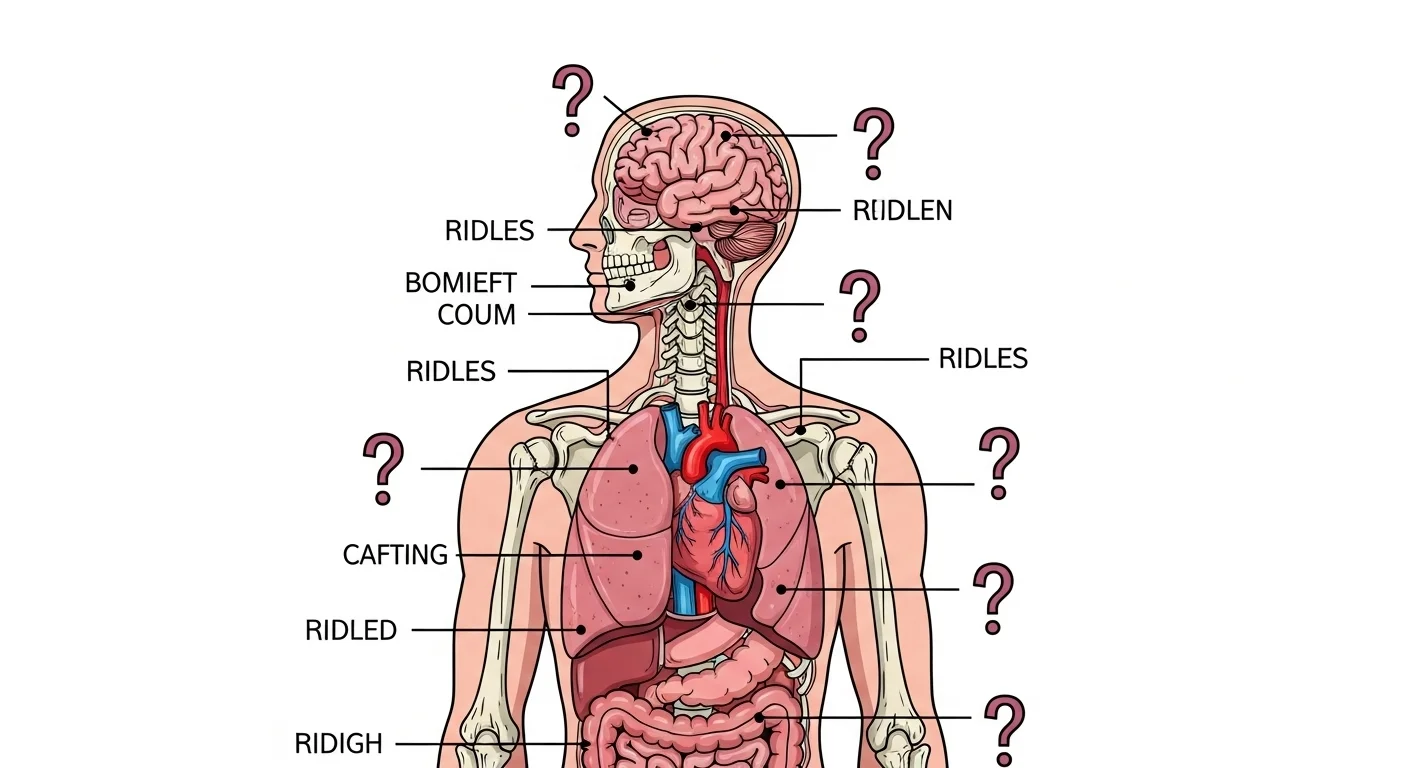
- Riddle: I am the control center of the body, processing information and controlling functions.
Hint: This organ is protected by the skull.
Answer: Brain
- Riddle: I pump blood throughout the body, keeping you alive with every beat.
Hint: This organ is about the size of your fist.
Answer: Heart
- Riddle: I am the largest organ in the human body, serving as a barrier against the outside world.
Hint: This organ covers your entire body.
Answer: Skin
- Riddle: I help you breathe, expanding and contracting with each breath.
Hint: These organs are located in your chest.
Answer: Lungs
- Riddle: I am made up of bones, providing structure and support to the body.
Hint: This system includes 206 parts in adults.
Answer: Skeleton
- Riddle: I connect muscles to bones, allowing movement.
Hint: These are tough, fibrous tissues.
Answer: Tendons
- Riddle: I am the master gland that controls other glands in the body.
Hint: This gland is located at the base of the brain.
Answer: Pituitary gland
- Riddle: I filter waste from the blood and produce urine.
Hint: You have two of these bean-shaped organs.
Answer: Kidneys
- Riddle: I am responsible for digestion, breaking down food into nutrients.
Hint: This organ is a muscular sac in your abdomen.
Answer: Stomach
- Riddle: I am the body’s largest internal organ, involved in detoxification.
Hint: This organ is located on the right side of your abdomen.
Answer: Liver
- Riddle: I am the tough outer layer of the tooth.
Hint: This is the hardest substance in the human body.
Answer: Enamel
- Riddle: I am the part of the eye that changes shape to focus light.
Hint: This structure is behind the pupil.
Answer: Lens
- Riddle: I am the largest bone in the human body.
Hint: This bone is in your thigh.
Answer: Femur
- Riddle: I am the muscle that allows you to smile.
Hint: This muscle is located in your cheeks.
Answer: Zygomaticus
- Riddle: I am the valve that prevents blood from flowing back into the heart.
Hint: This valve is between the heart’s chambers.
Answer: Atrioventricular valve
- Riddle: I am the system that fights off infections.
Hint: This system includes white blood cells.
Answer: Immune system
- Riddle: I am the hormone that regulates blood sugar.
Hint: This hormone is produced by the pancreas.
Answer: Insulin
- Riddle: I am the part of the brain responsible for balance.
Hint: This structure is located at the back of the brain.
Answer: Cerebellum
- Riddle: I am the tube that carries food from the mouth to the stomach.
Hint: This organ is also known as the food pipe.
Answer: Esophagus
- Riddle: I am the smallest bone in the human body.
Hint: This bone is located in the ear.
Answer: Stapes
Medical Instruments Riddles
Explore the tools doctors and nurses rely on, from stethoscopes to high-tech imaging devices.

- Riddle: I am used to listen to the heart and lungs.
Hint: This instrument is worn around the neck.
Answer: Stethoscope
- Riddle: I am used to measure blood pressure.
Hint: This device includes a cuff and a gauge.
Answer: Sphygmomanometer
- Riddle: I am used to draw blood or give injections.
Hint: This tool has a needle and a plunger.
Answer: Syringe
- Riddle: I am used to see inside the body without surgery.
Hint: This machine uses radiation to create images.
Answer: X-ray machine
- Riddle: I am used to correct vision.
Hint: These are worn on the face.
Answer: Eyeglasses
- Riddle: I am used to examine the ear.
Hint: This instrument has a light and a cone-shaped tip.
Answer: Otoscope
- Riddle: I am used to measure temperature.
Hint: This device can be placed under the tongue or in the ear.
Answer: Thermometer
- Riddle: I am used to hold a patient’s mouth open during dental procedures.
Hint: This tool is often used by dentists.
Answer: Mouth gag
- Riddle: I am used to cut tissue during surgery.
Hint: This sharp instrument is a surgeon’s best friend.
Answer: Scalpel
- Riddle: I am used to provide oxygen to patients.
Hint: This device covers the nose and mouth.
Answer: Oxygen mask
- Riddle: I am used to measure the electrical activity of the heart.
Hint: This machine produces a graph called an ECG.
Answer: Electrocardiograph (ECG machine)
- Riddle: I am used to remove wax from the ear.
Hint: This tool is small and spoon-shaped.
Answer: Ear curette
- Riddle: I am used to hold surgical instruments during operations.
Hint: This device keeps tissues or organs out of the way.
Answer: Surgical retractor
- Riddle: I am used to suction fluids from the body during surgery.
Hint: This device is often used to clear the surgical field.
Answer: Suction device
- Riddle: I am used to visualize the inside of the body with sound waves.
Hint: This machine is commonly used in pregnancy.
Answer: Ultrasound machine
- Riddle: I am used to cut and shape bones during surgery.
Hint: This tool is sharp and often powered.
Answer: Bone saw
- Riddle: I am used to inflate lungs during resuscitation.
Hint: This device is also known as an Ambu bag.
Answer: Bag valve mask
- Riddle: I am used to immobilize broken bones.
Hint: This tool is often made of plaster or fiberglass.
Answer: Splint
- Riddle: I am used to deliver anesthesia.
Hint: This machine controls the flow of gases.
Answer: Anesthesia machine
- Riddle: I am used to monitor fetal heart rate during pregnancy.
Hint: This device uses sound waves to detect heartbeats.
Answer: Doppler device
Diseases and Conditions Riddles
Tackle common and rare health conditions that challenge medical professionals. For more on diseases, see disease riddles.
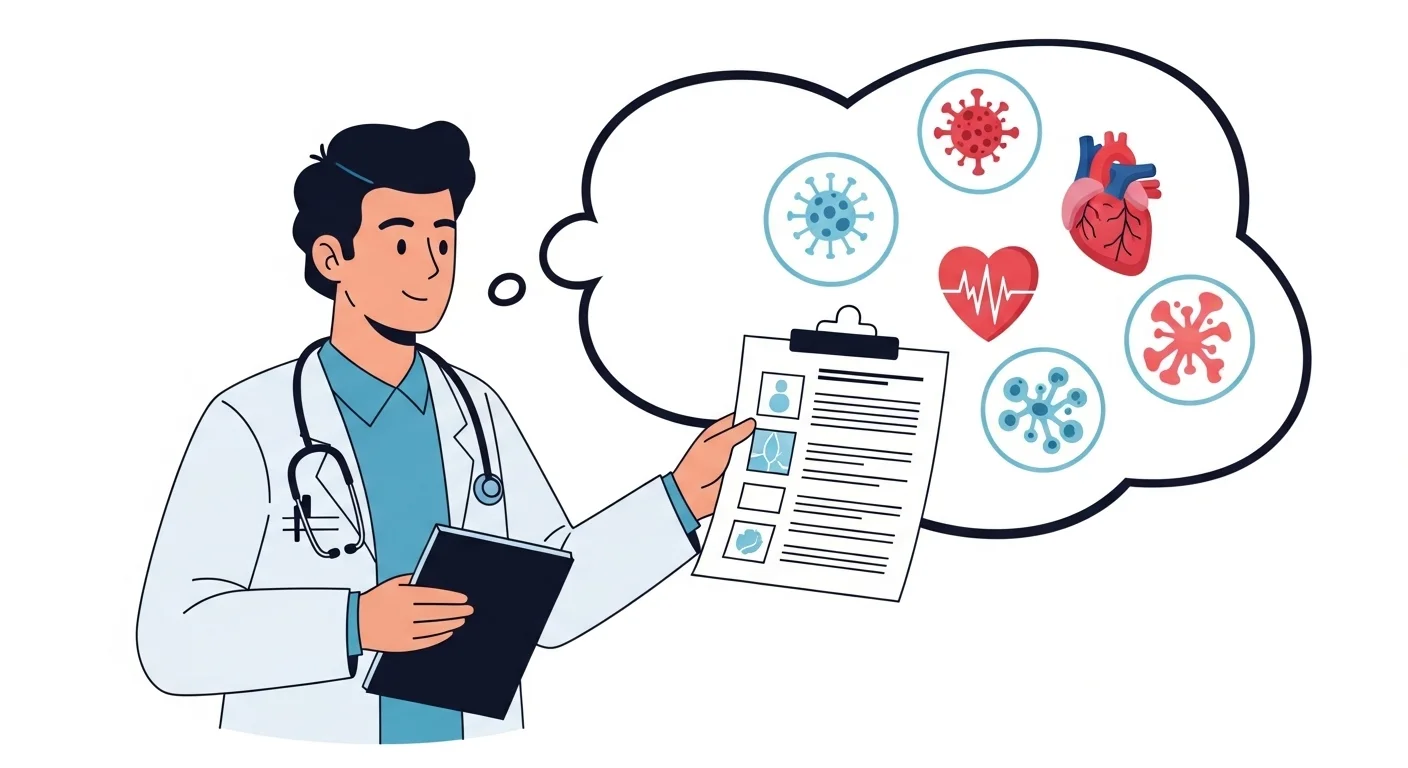
- Riddle: I am used to listen to the heart and lungs.
Hint: This instrument is worn around the neck.
Answer: Stethoscope
- Riddle: I am used to measure blood pressure.
Hint: This device includes a cuff and a gauge.
Answer: Sphygmomanometer
- Riddle: I am used to draw blood or give injections.
Hint: This tool has a needle and a plunger.
Answer: Syringe
- Riddle: I am used to see inside the body without surgery.
Hint: This machine uses radiation to create images.
Answer: X-ray machine
- Riddle: I am used to correct vision.
Hint: These are worn on the face.
Answer: Eyeglasses
- Riddle: I am used to examine the ear.
Hint: This instrument has a light and a cone-shaped tip.
Answer: Otoscope
- Riddle: I am used to measure temperature.
Hint: This device can be placed under the tongue or in the ear.
Answer: Thermometer
- Riddle: I am used to hold a patient’s mouth open during dental procedures.
Hint: This tool is often used by dentists.
Answer: Mouth gag
- Riddle: I am used to cut tissue during surgery.
Hint: This sharp instrument is a surgeon’s best friend.
Answer: Scalpel
- Riddle: I am used to provide oxygen to patients.
Hint: This device covers the nose and mouth.
Answer: Oxygen mask
- Riddle: I am used to measure the electrical activity of the heart.
Hint: This machine produces a graph called an ECG.
Answer: Electrocardiograph (ECG machine)
- Riddle: I am used to remove wax from the ear.
Hint: This tool is small and spoon-shaped.
Answer: Ear curette
- Riddle: I am used to hold surgical instruments during operations.
Hint: This device keeps tissues or organs out of the way.
Answer: Surgical retractor
- Riddle: I am used to suction fluids from the body during surgery.
Hint: This device is often used to clear the surgical field.
Answer: Suction device
- Riddle: I am used to visualize the inside of the body with sound waves.
Hint: This machine is commonly used in pregnancy.
Answer: Ultrasound machine
- Riddle: I am used to cut and shape bones during surgery.
Hint: This tool is sharp and often powered.
Answer: Bone saw
- Riddle: I am used to inflate lungs during resuscitation.
Hint: This device is also known as an Ambu bag.
Answer: Bag valve mask
- Riddle: I am used to immobilize broken bones.
Hint: This tool is often made of plaster or fiberglass.
Answer: Splint
- Riddle: I am used to deliver anesthesia.
Hint: This machine controls the flow of gases.
Answer: Anesthesia machine
- Riddle: I am used to monitor fetal heart rate during pregnancy.
Hint: This device uses sound waves to detect heartbeats.
Answer: Doppler device
Medical Procedures and Treatments Riddles
These riddles focus on the procedures and treatments that save lives and restore health.

- Riddle: I am a procedure where a small sample of tissue is removed for examination.
Hint: This test is often used to diagnose cancer.
Answer: Biopsy
- Riddle: I am a treatment that uses high-energy rays to kill cancer cells.
Hint: This therapy is often used alongside surgery or chemotherapy.
Answer: Radiation therapy
- Riddle: I am a surgical procedure to remove the appendix.
Hint: This operation is often performed in cases of appendicitis.
Answer: Appendectomy
- Riddle: I am a non-invasive imaging technique that uses magnets and radio waves.
Hint: This test is often used to diagnose soft tissue injuries.
Answer: MRI (Magnetic Resonance Imaging)
- Riddle: I am a procedure to remove plaque from the arteries.
Hint: This intervention often involves inserting a balloon or stent.
Answer: Angioplasty
- Riddle: I am a treatment that uses electrical shocks to restore normal heart rhythm.
Hint: This is often used in cases of cardiac arrest.
Answer: Defibrillation
- Riddle: I am a surgical procedure to repair or replace a faulty heart valve.
Hint: This operation can be open-heart or minimally invasive.
Answer: Valvuloplasty
- Riddle: I am a treatment that involves removing decayed tooth structure.
Hint: This is often followed by placing a filling.
Answer: Dental filling
- Riddle: I am a procedure to realign bones and joints.
Hint: This surgery is common for fractures or dislocations.
Answer: Orthopedic surgery
- Riddle: I am a treatment that uses drugs to kill cancer cells.
Hint: This therapy can be systemic or targeted.
Answer: Chemotherapy
- Riddle: I am a procedure to remove kidney stones.
Hint: This treatment often uses sound waves or lasers.
Answer: Lithotripsy
- Riddle: I am a treatment that uses light to kill cancer cells.
Hint: This therapy is often used for skin or lung cancer.
Answer: Photodynamic therapy
- Riddle: I am a surgical procedure to remove the gallbladder.
Hint: This operation is often performed laparoscopically.
Answer: Cholecystectomy
- Riddle: I am a procedure to bypass blocked coronary arteries.
Hint: This surgery uses grafts to reroute blood flow.
Answer: Coronary artery bypass grafting (CABG)
- Riddle: I am a treatment that uses cold temperatures to destroy abnormal tissue.
Hint: This therapy is often used for warts or precancerous lesions.
Answer: Cryotherapy
- Riddle: I am a procedure to remove a cataract from the eye.
Hint: This surgery involves replacing the lens.
Answer: Cataract surgery
- Riddle: I am a treatment that uses electrical stimulation to relieve pain.
Hint: This therapy is often used for chronic pain management.
Answer: TENS (Transcutaneous Electrical Nerve Stimulation)
- Riddle: I am a surgical procedure to repair a hernia.
Hint: This operation involves reinforcing the abdominal wall.
Answer: Herniorrhaphy
- Riddle: I am a procedure to remove plaque from the inside of an artery.
Hint: This intervention is often used for peripheral artery disease.
Answer: Atherectomy
- Riddle: I am a treatment that uses sound waves to break up kidney stones.
Hint: This non-invasive procedure is called lithotripsy.
Answer: Extracorporeal shock wave lithotripsy (ESWL)
Pharmacology Riddles
Let’s dive into the world of medicines and drugs, where chemistry meets healing.
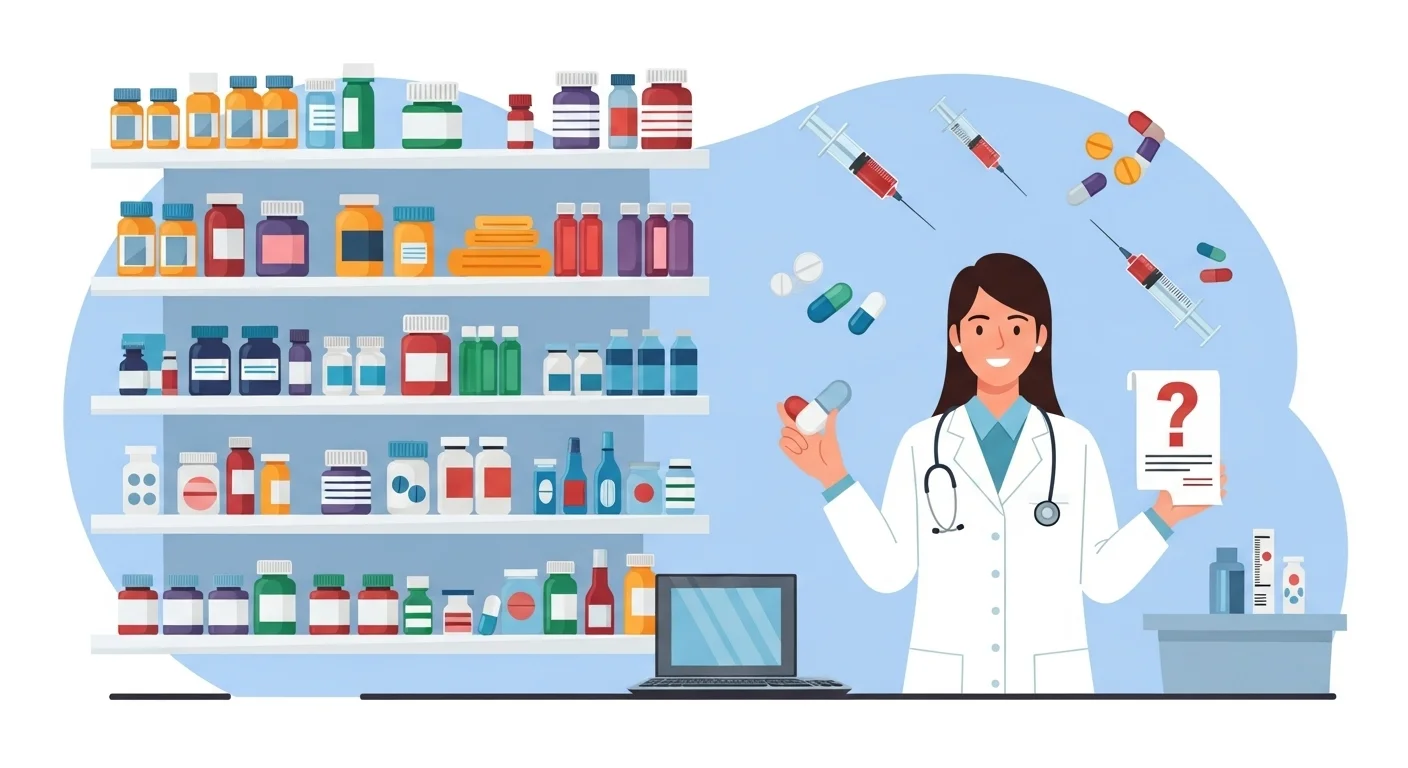
- Riddle: I am a drug used to relieve pain.
Hint: This medication is often used for headaches or injuries.
Answer: Analgesic
- Riddle: I am a drug used to treat bacterial infections.
Hint: This medication is often prescribed for strep throat or pneumonia.
Answer: Antibiotic
- Riddle: I am a drug used to lower blood pressure.
Hint: This medication helps relax blood vessels.
Answer: Antihypertensive
- Riddle: I am a drug used to treat fungal infections.
Hint: This medication is often used for athlete’s foot or yeast infections.
Answer: Antifungal
- Riddle: I am a drug used to prevent blood clots.
Hint: This medication is often prescribed after surgery.
Answer: Anticoagulant
- Riddle: I am a drug used to treat allergies.
Hint: This medication blocks histamine.
Answer: Antihistamine
- Riddle: I am a drug used to reduce inflammation.
Hint: This medication is often used for arthritis or allergies.
Answer: Corticosteroid
- Riddle: I am a drug used to treat diabetes.
Hint: This hormone is produced by the pancreas.
Answer: Insulin
- Riddle: I am a drug used to induce sleep.
Hint: This medication is often prescribed for insomnia.
Answer: Sedative
- Riddle: I am a drug used to treat depression.
Hint: This medication affects neurotransmitters in the brain.
Answer: Antidepressant
- Riddle: I am a drug used to prevent seizures.
Hint: This medication is often prescribed for epilepsy.
Answer: Anticonvulsant
- Riddle: I am a drug used to treat high cholesterol.
Hint: This medication lowers LDL levels.
Answer: Statin
- Riddle: I am a drug used to treat osteoporosis.
Hint: This medication helps strengthen bones.
Answer: Bisphosphonate
- Riddle: I am a drug used to treat Parkinson’s disease.
Hint: This medication helps manage tremors and stiffness.
Answer: Levodopa
- Riddle: I am a drug used to treat glaucoma.
Hint: This medication reduces pressure in the eye.
Answer: Prostaglandin analog
- Riddle: I am a drug used to treat gout.
Hint: This medication reduces uric acid levels.
Answer: Colchicine
- Riddle: I am a drug used to treat asthma.
Hint: This medication helps open airways.
Answer: Bronchodilator
- Riddle: I am a drug used to treat anxiety.
Hint: This medication is often prescribed for short-term use.
Answer: Benzodiazepine
- Riddle: I am a drug used to treat ADHD.
Hint: This medication helps improve focus.
Answer: Stimulant
- Riddle: I am a drug used to prevent organ rejection after transplant.
Hint: This medication suppresses the immune system.
Answer: Immunosuppressant
Hospital and Healthcare Settings Riddles
Explore the places and roles making healthcare possible, from hospitals to specialized departments.
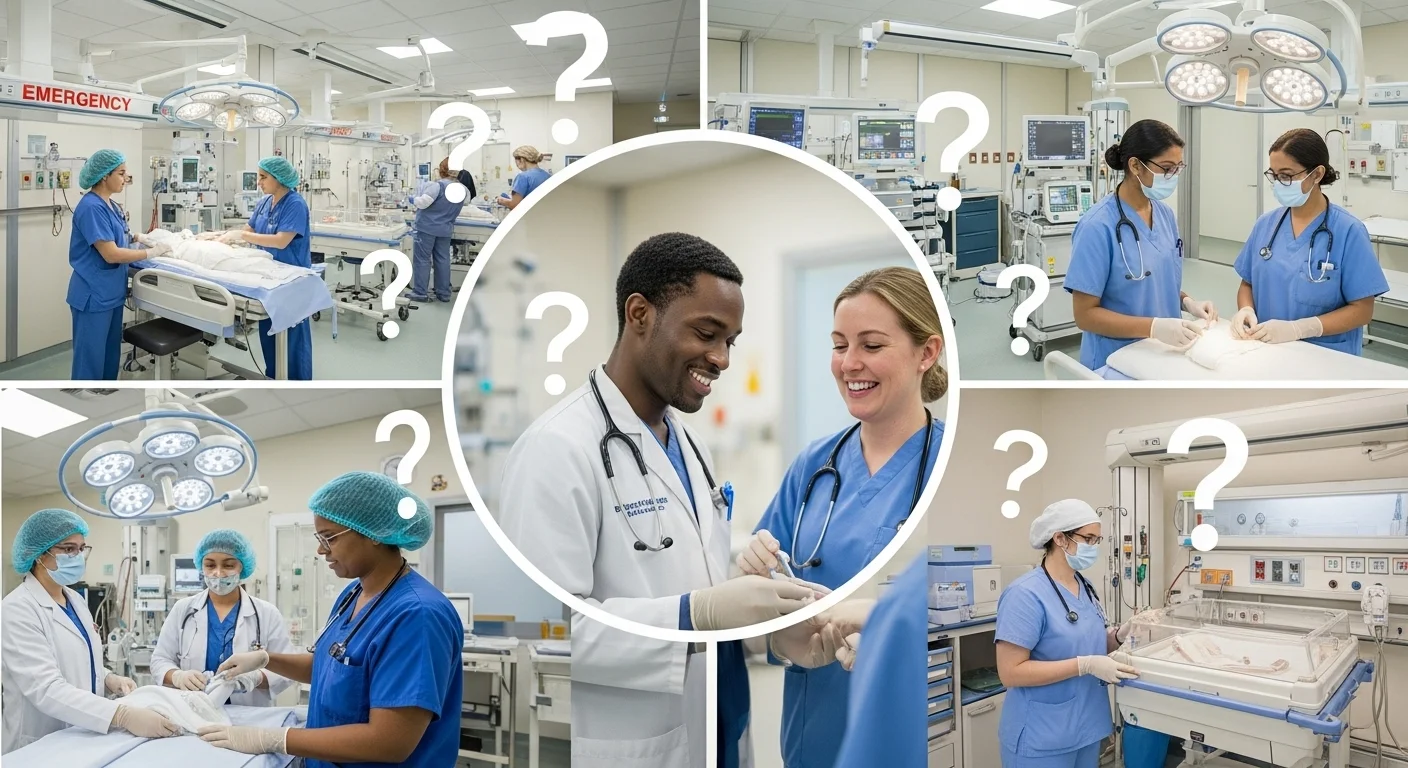
- Riddle: I am a place where patients stay overnight for treatment.
Hint: This facility provides comprehensive care.
Answer: Hospital
- Riddle: I am a department in the hospital that provides emergency care.
Hint: This area handles urgent medical situations.
Answer: Emergency room
- Riddle: I am a healthcare professional who prescribes medication.
Hint: This person often leads the medical team.
Answer: Doctor
- Riddle: I am a healthcare professional who administers nursing care.
Hint: This person is often the primary caregiver for patients.
Answer: Nurse
- Riddle: I am a machine that monitors a patient’s vital signs.
Hint: This device tracks heart rate, blood pressure, and more.
Answer: Patient monitor
- Riddle: I am a room where surgeries are performed.
Hint: This area is sterile and equipped for operations.
Answer: Operating room
- Riddle: I am a place where X-rays are taken.
Hint: This department uses imaging technology.
Answer: Radiology department
- Riddle: I am a professional who dispenses medication.
Hint: This person works in a pharmacy.
Answer: Pharmacist
- Riddle: I am a place where patients recover after surgery.
Hint: This area is often near the operating room.
Answer: Recovery room
- Riddle: I am a vehicle used to transport sick or injured people.
Hint: This vehicle is equipped with medical supplies.
Answer: Ambulance
- Riddle: I am a place where newborns are cared for in the hospital.
Hint: This area is for healthy infants after birth.
Answer: Nursery
- Riddle: I am a department that provides physical therapy.
Hint: This area helps patients regain mobility.
Answer: Rehabilitation department
- Riddle: I am a professional who takes X-rays.
Hint: This person operates imaging equipment.
Answer: Radiologic technologist
- Riddle: I am a place where patients receive chemotherapy.
Hint: This department treats cancer patients.
Answer: Oncology department
- Riddle: I am a machine that provides dialysis.
Hint: This device filters waste from the blood.
Answer: Dialysis machine
- Riddle: I am a professional who assists in surgery.
Hint: This person hands instruments to the surgeon.
Answer: Surgical technician
- Riddle: I am a place where patients with infectious diseases are isolated.
Hint: This area prevents the spread of contagions.
Answer: Isolation room
- Riddle: I am a department that provides care for premature babies.
Hint: This unit is for critically ill newborns.
Answer: Neonatal intensive care unit (NICU)
- Riddle: I am a professional who performs laboratory tests on blood and other samples.
Hint: This person works behind the scenes in diagnostics.
Answer: Medical laboratory scientist
- Riddle: I am a place where patients go for outpatient surgeries.
Hint: This center allows patients to go home the same day.
Answer: Ambulatory surgery center
Medical History and Famous Figures Riddles
Honor the pioneers who shaped modern medicine with these historical riddles.
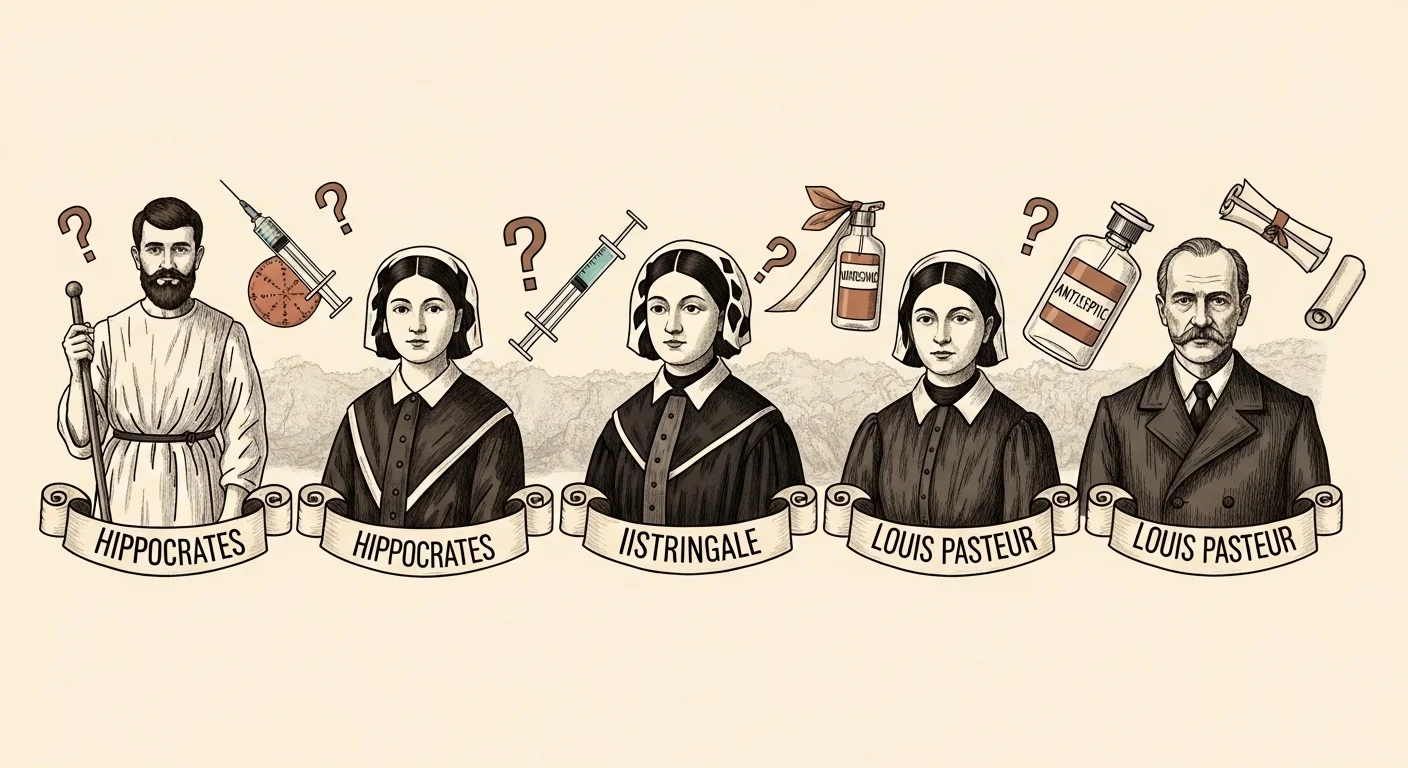
- Riddle: I am the father of modern medicine, known for the Hippocratic Oath.
Hint: This ancient Greek physician is considered the founder of medical ethics.
Answer: Hippocrates
- Riddle: I discovered penicillin, revolutionizing medicine.
Hint: This Scottish scientist’s discovery led to antibiotics.
Answer: Alexander Fleming
- Riddle: I developed the smallpox vaccine.
Hint: This English physician’s work laid the foundation for immunization.
Answer: Edward Jenner
- Riddle: I am known for my work on the structure of DNA.
Hint: These scientists shared the Nobel Prize in 1962.
Answer: James Watson and Francis Crick
- Riddle: I pioneered the use of antiseptics in surgery.
Hint: This British surgeon introduced carbolic acid to sterilize instruments.
Answer: Joseph Lister
- Riddle: I developed the first effective polio vaccine.
Hint: This American scientist’s work led to polio eradication in many countries.
Answer: Jonas Salk
- Riddle: I am the first woman to win a Nobel Prize, for her work on radioactivity.
Hint: This physicist discovered radium and polonium.
Answer: Marie Curie
- Riddle: I founded the Red Cross.
Hint: This Swiss humanitarian’s work led to international aid organizations.
Answer: Henry Dunant
- Riddle: I am known for my work on the circulatory system.
Hint: This English physician described how blood flows through the body.
Answer: William Harvey
- Riddle: I developed the first successful rabies vaccine.
Hint: This French scientist is also known for pasteurization.
Answer: Louis Pasteur
- Riddle: I am the first person to use anesthesia during surgery.
Hint: This American dentist used ether in 1846.
Answer: William Morton
- Riddle: I discovered the link between microorganisms and disease.
Hint: This German physician is known for his work on anthrax and tuberculosis.
Answer: Robert Koch
- Riddle: I developed the first successful heart transplant procedure.
Hint: This South African surgeon performed the surgery in 1967.
Answer: Christiaan Barnard
- Riddle: I am known for my work on the germ theory of disease.
Hint: This French scientist disproved spontaneous generation.
Answer: Louis Pasteur
- Riddle: I founded the science of nursing.
Hint: This British nurse is known for her work during the Crimean War.
Answer: Florence Nightingale
- Riddle: I discovered insulin, which treats diabetes.
Hint: These Canadian scientists shared the Nobel Prize in 1923.
Answer: Frederick Banting and Charles Best
- Riddle: I developed the first artificial heart.
Hint: This Dutch physician also invented the kidney dialysis machine.
Answer: Willem Kolff
- Riddle: I am known for my work on vaccines, including the anthrax vaccine.
Hint: This French scientist is considered the father of microbiology.
Answer: Louis Pasteur
- Riddle: I pioneered the use of X-rays in medicine.
Hint: This German physicist won the first Nobel Prize in Physics.
Answer: Wilhelm Röntgen
- Riddle: I developed the first successful polio vaccine using a live virus.
Hint: This American virologist’s vaccine was oral.
Answer: Albert Sabin
Fun and Jokes Riddles
Let’s lighten the mood with some medical humor that’s sure to make you smile.
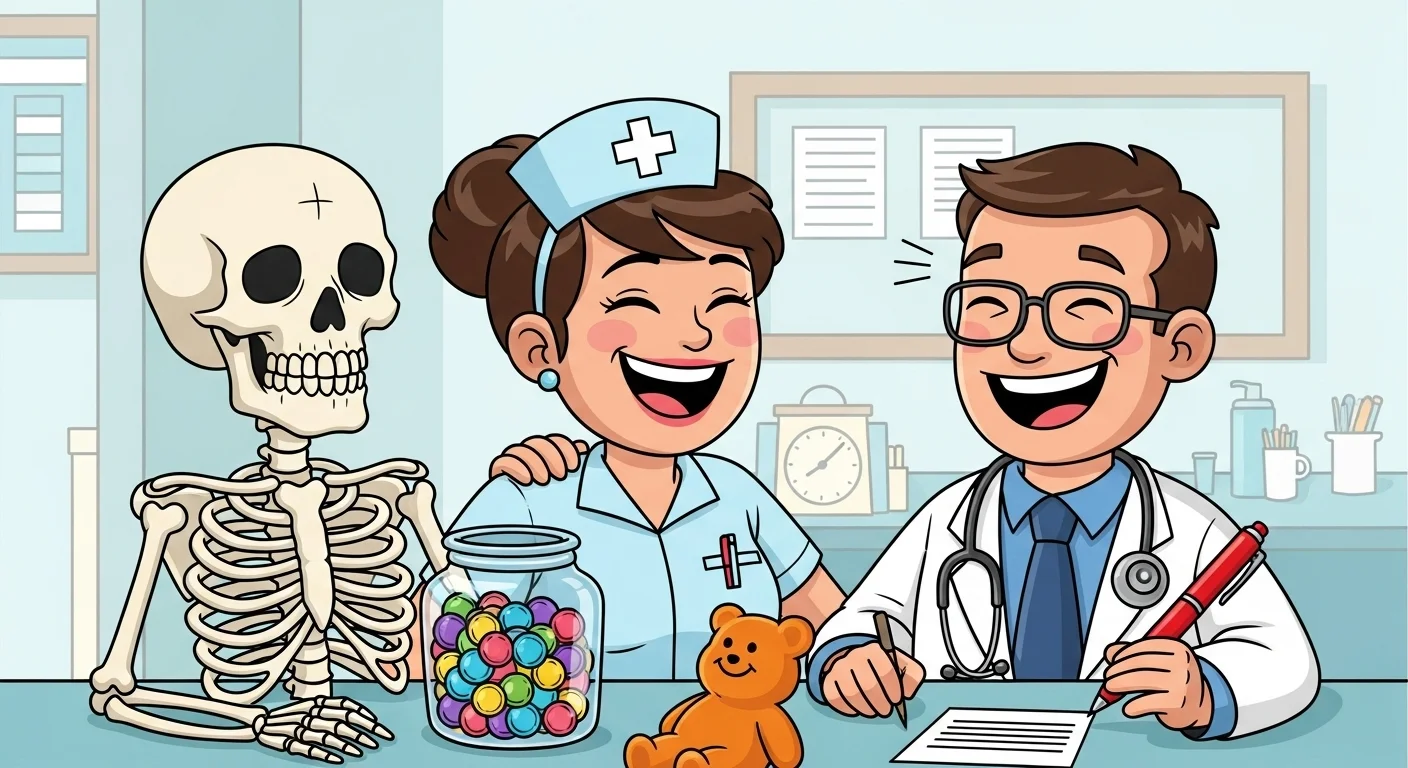
- Riddle: Why did the skeleton go to the doctor?
Hint: Think of a pun involving the skeleton’s lack of a certain body part.
Answer: Because he had no body to turn to!
- Riddle: What do you call a nurse who gives you candy?
Hint: This is a play on words involving a type of candy and a lifesaving device.
Answer: A life saver!
- Riddle: Why did the patient bring a red marker to the hospital?
Hint: Think of a medical procedure involving “drawing.”
Answer: In case they needed to draw blood!
- Riddle: What do you call a doctor who fixes websites?
Hint: This is a play on words involving a medical specialty and internet terminology.
Answer: A URL specialist!
- Riddle: Why did the bacteria go to the dance?
Hint: Think of a fun activity involving movement.
Answer: Because it wanted to boogie-woogie with the fungi!
- Riddle: What do you call a dinosaur with an extensive vocabulary?
Hint: This is a pun on a type of reference book.
Answer: A thesaurus!
- Riddle: Why did the pharmacist win the race?
Hint: Think of a medical term related to speed and energy.
Answer: Because he was trained to run on adrenaline!
- Riddle: What do you call a nurse who sings?
Hint: This is a play on words involving music and medicine.
Answer: A melody medic!
- Riddle: Why did the medical student bring a ladder to the bar?
Hint: Think of a phrase involving height and social status.
Answer: Because they heard the drinks were on the house!
- Riddle: What do you call a doctor who specializes in treating clowns?
Hint: This is a play on words involving a medical specialty and entertainment.
Answer: A funnysician!
- Riddle: Why did the doctor carry a red pen?
Hint: Think of a medical procedure involving “drawing.”
Answer: In case they needed to draw blood!
- Riddle: What do you call a nurse with a six-pack?
Hint: This is a play on words involving physical fitness and medical expertise.
Answer: A medical marvel!
- Riddle: Why did the skeleton go to the dance alone?
Hint: Think of a pun involving the skeleton’s lack of a partner.
Answer: Because he had no body to go with!
- Riddle: What do you call a dinosaur that’s a doctor?
Hint: This is a play on words involving a medical profession and prehistoric creatures.
Answer: A dino-saurgeon!
- Riddle: Why did the pharmacist win an award?
Hint: Think of a phrase involving excellence in a profession.
Answer: Because he was outstanding in his field!
- Riddle: What do you call a bear with no teeth?
Hint: This is a play on words involving a type of candy.
Answer: A gummy bear, but in a medical context, it’s toothless!
- Riddle: Why did the banana go to the hospital?
Hint: Think of a pun involving the banana’s condition.
Answer: Because it wasn’t peeling well.
- Riddle: What do you call a nurse who sings?
Hint: This is a play on words involving music and medicine.
Answer: A melody medic!
- Riddle: Why did the computer go to the doctor?
Hint: Think of a common issue with computers.
Answer: Because it had a virus!
- Riddle: What do you call a doctor who fixes websites?
Hint: This is a play on words involving a medical specialty and internet terminology.
Answer: A URL specialist!
Medical Specialties Riddles
Test knowledge of medical fields, with insights from the American Medical Association.
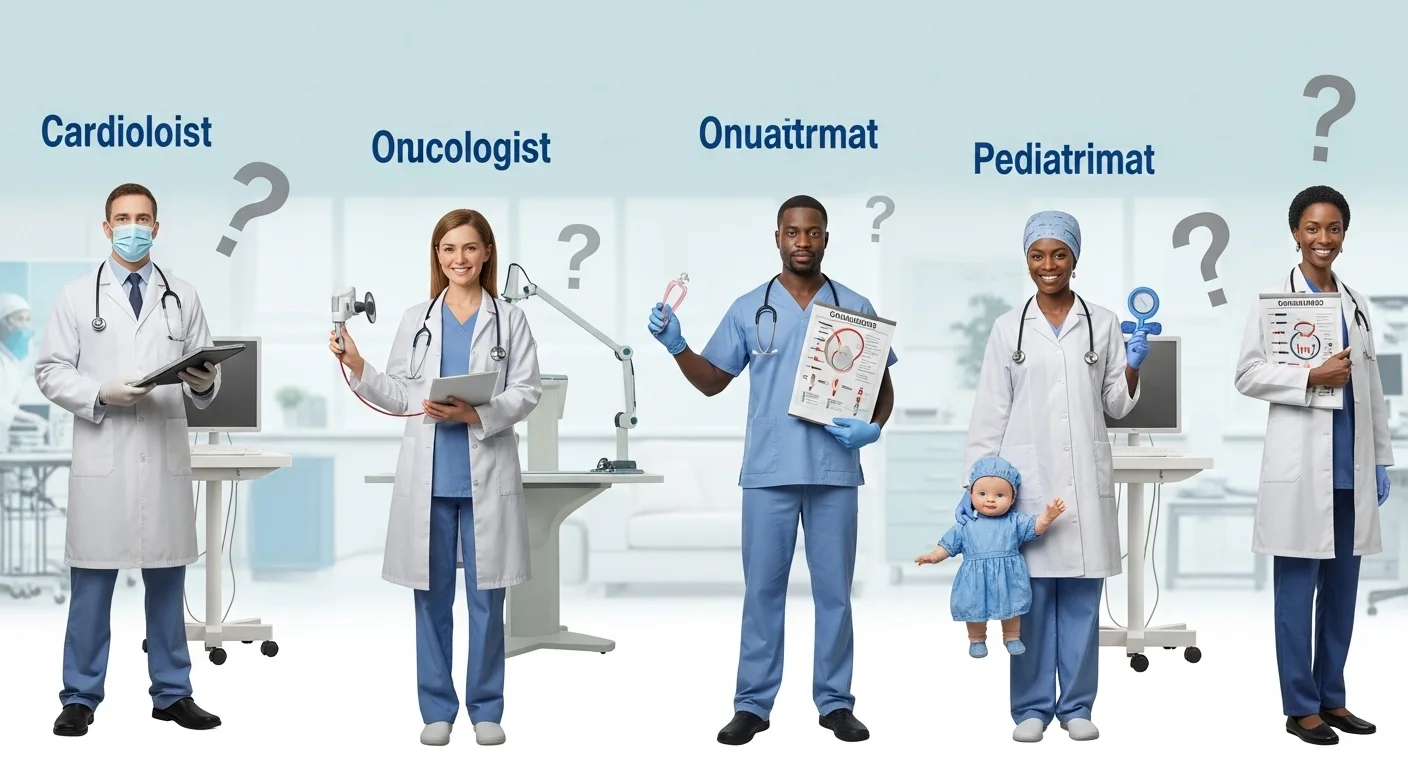
- Riddle: I am the branch of medicine that deals with the heart and circulatory system.
Hint: This specialty often involves procedures like angioplasty.
Answer: Cardiology
- Riddle: I am the field of medicine that focuses on the diagnosis and treatment of cancer.
Hint: This specialty uses treatments like chemotherapy and radiation.
Answer: Oncology
- Riddle: I am the branch of medicine that deals with the nervous system.
Hint: This specialty treats conditions like epilepsy and Parkinson’s disease.
Answer: Neurology
- Riddle: I am the field of medicine that focuses on the care of children.
Hint: This specialty covers the health of infants, children, and adolescents.
Answer: Pediatrics
- Riddle: I am the branch of medicine that deals with the skin.
Hint: This specialty treats conditions like acne and skin cancer.
Answer: Dermatology
- Riddle: I am the field of medicine that focuses on the care of the elderly.
Hint: This specialty addresses the unique health needs of older adults.
Answer: Geriatrics
- Riddle: I am the branch of medicine that deals with the musculoskeletal system.
Hint: This specialty treats conditions like fractures and arthritis.
Answer: Orthopedics
- Riddle: I am the field of medicine that focuses on the care of women during pregnancy and childbirth.
Hint: This specialty includes prenatal care and delivery.
Answer: Obstetrics
- Riddle: I am the branch of medicine that deals with the digestive system.
Hint: This specialty treats conditions like ulcers and liver disease.
Answer: Gastroenterology
- Riddle: I am the field of medicine that focuses on mental health.
Hint: This specialty treats conditions like depression and anxiety.
Answer: Psychiatry
- Riddle: I am the branch of medicine that deals with the immune system.
Hint: This specialty treats allergies and autoimmune diseases.
Answer: Immunology
- Riddle: I am the field of medicine that focuses on the care of the eyes.
Hint: This specialty treats conditions like cataracts and glaucoma.
Answer: Ophthalmology
Medical Terminology Riddles
These riddles challenge your understanding of medical language.
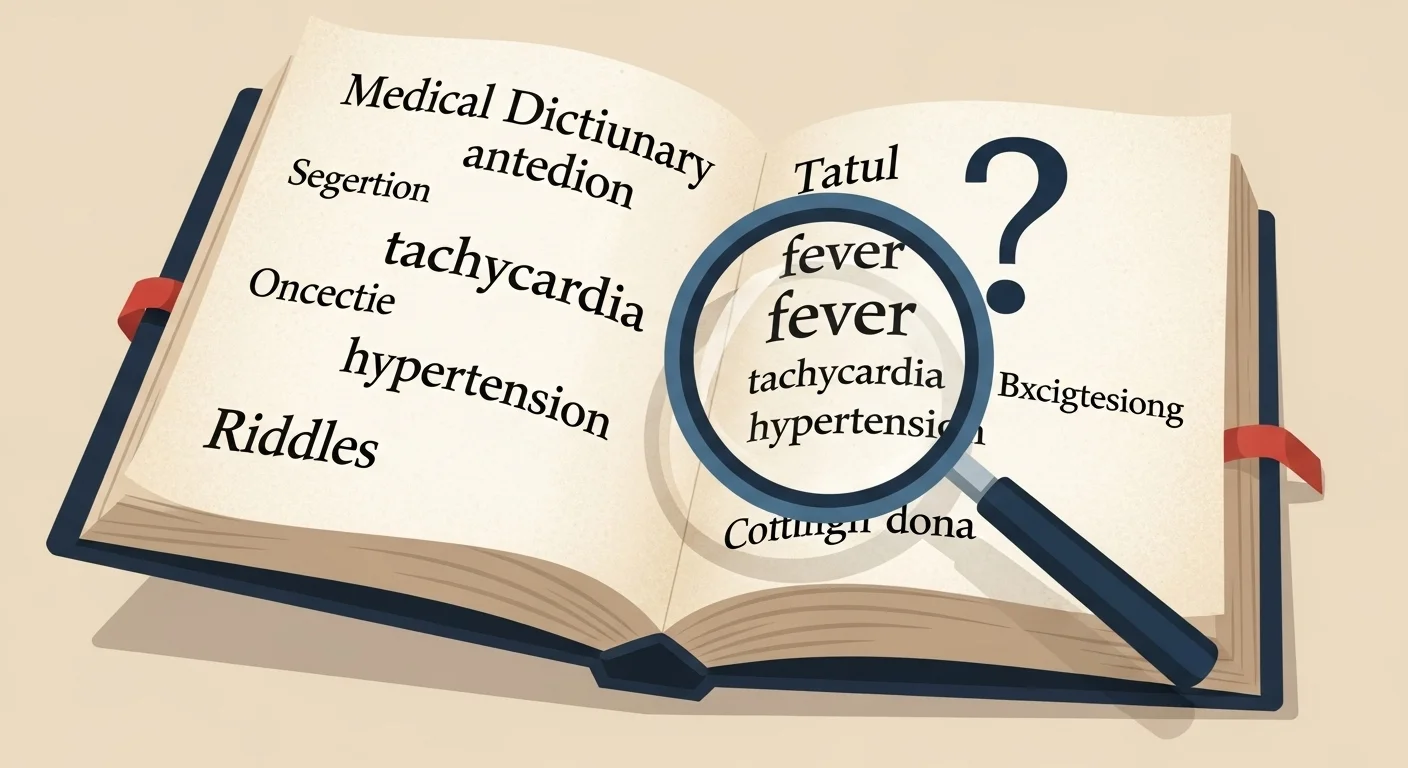
- Riddle: I am the term for a high body temperature.
Hint: This condition is often a sign of infection.
Answer: Fever
- Riddle: I am the medical term for a broken bone.
Hint: This injury often requires a cast or surgery.
Answer: Fracture
- Riddle: I am the term for a rapid heartbeat.
Hint: This condition can be caused by stress or heart disease.
Answer: Tachycardia
- Riddle: I am the medical term for the loss of consciousness.
Hint: This state can be temporary or prolonged.
Answer: Coma
- Riddle: I am the term for a low body temperature.
Hint: This condition can be caused by exposure to cold.
Answer: Hypothermia
- Riddle: I am the medical term for a nosebleed.
Hint: This condition is often caused by dry air or trauma.
Answer: Epistaxis
- Riddle: I am the term for a condition characterized by high blood pressure.
Hint: This condition can lead to heart disease and stroke.
Answer: Hypertension
- Riddle: I am the medical term for a heart attack.
Hint: This event occurs when blood flow to the heart is blocked.
Answer: Myocardial infarction
- Riddle: I am the term for a condition where the airways narrow, causing difficulty breathing.
Hint: This condition is often triggered by allergens.
Answer: Asthma
- Riddle: I am the medical term for the surgical removal of a body part.
Hint: This procedure is often used to treat cancer or injury.
Answer: Amputation
- Riddle: I am the term for a condition where the blood sugar level is too low.
Hint: This condition can cause dizziness and confusion.
Answer: Hypoglycemia
- Riddle: I am the medical term for a blood clot in a vein.
Hint: This condition can be life-threatening if it travels to the lungs.
Answer: Deep vein thrombosis (DVT)
Patient Care Riddles
Focus on caring for patients.
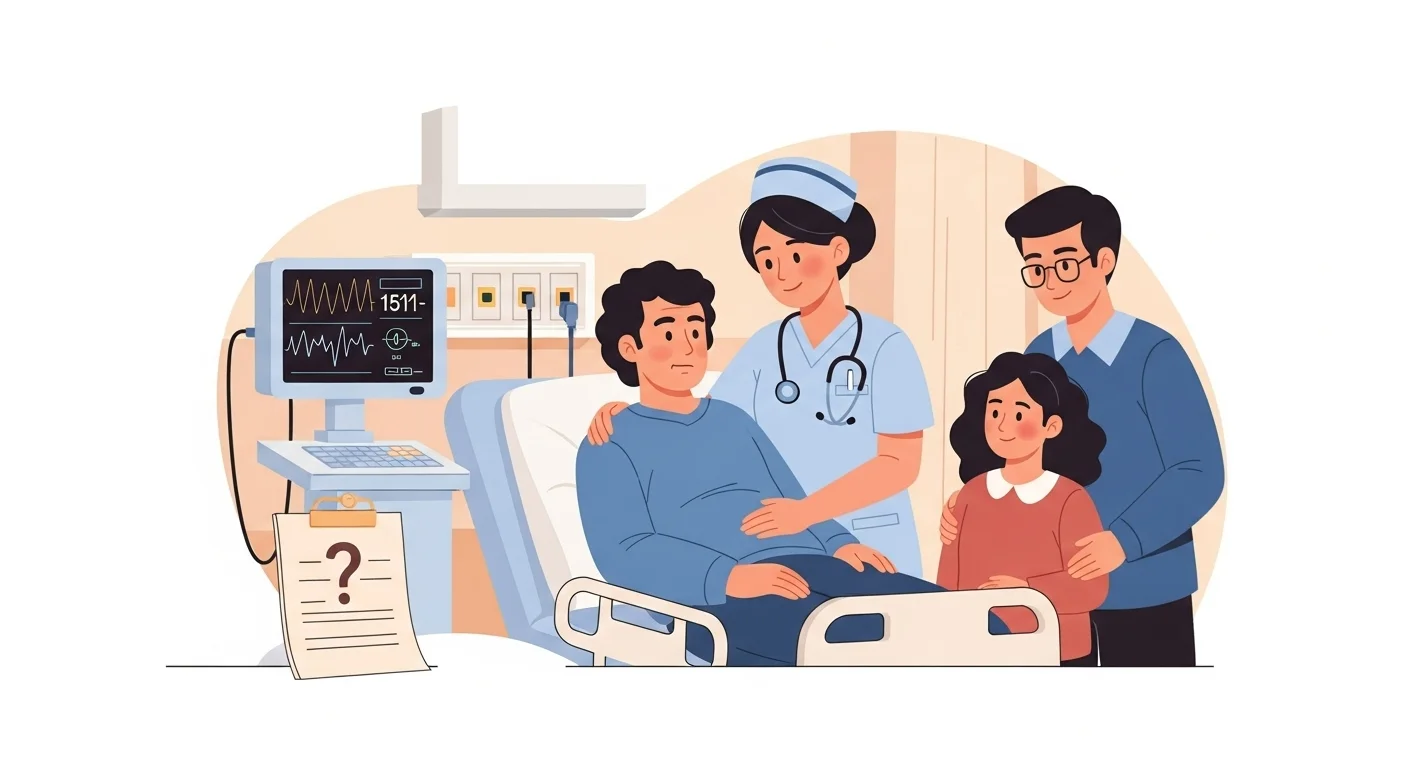
- Riddle: I am the process of listening to a patient’s concerns and providing emotional support.
Hint: This aspect of care is crucial for building trust.
Answer: Empathy
- Riddle: I am the act of explaining medical information to a patient in a way they can understand.
Hint: This is essential for informed consent.
Answer: Communication
- Riddle: I am the process of assessing a patient’s condition and determining the appropriate treatment.
Hint: This is a crucial step in providing effective care.
Answer: Diagnosis
- Riddle: I am the act of providing comfort and support to a patient during their illness.
Hint: This type of care focuses on quality of life.
Answer: Palliative care
- Riddle: I am the process of monitoring a patient’s vital signs.
Hint: This is a routine part of patient assessment.
Answer: Vital signs monitoring
- Riddle: I am the act of providing care to a patient at the end of life.
Hint: This care focuses on comfort and dignity.
Answer: Hospice care
- Riddle: I am the process of administering medications to a patient.
Hint: This task is often performed by nurses.
Answer: Medication administration
- Riddle: I am the act of providing emotional support to a patient’s family.
Hint: This is crucial during difficult times.
Answer: Family support
- Riddle: I am the process of educating a patient about their condition and treatment options.
Hint: This empowers patients to make informed decisions.
Answer: Patient education
- Riddle: I am the act of ensuring a patient’s safety during their hospital stay.
Hint: This includes preventing falls and infections.
Answer: Patient safety
- Riddle: I am the process of coordinating a patient’s care among different healthcare providers.
Hint: This ensures continuity of care.
Answer: Care coordination
- Riddle: I am the act of advocating for a patient’s needs and rights.
Hint: This is essential for patient-centered care.
Answer: Patient advocacy
Medical Ethics Riddles
Explore ethical principles in healthcare, guided by standards like those from the World Health Organization.
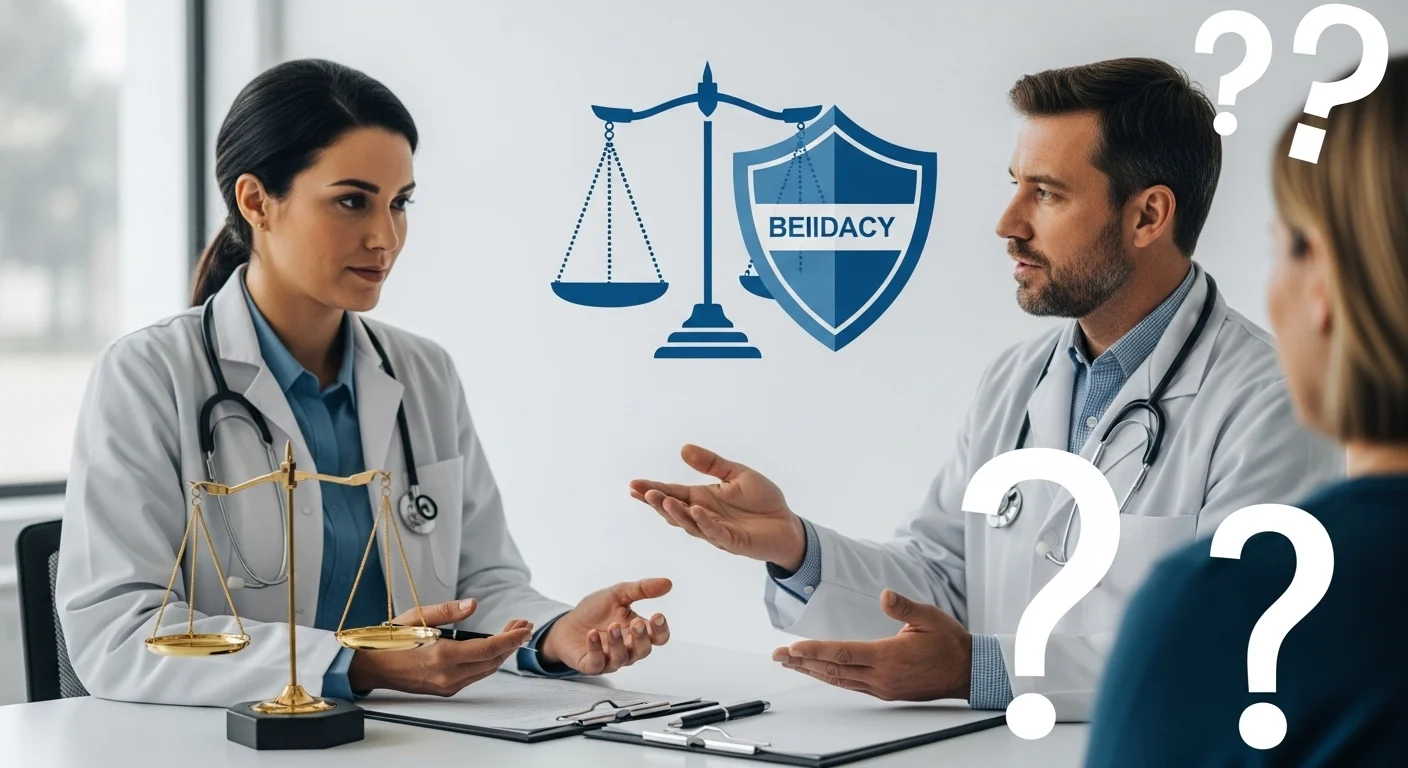
- Riddle: I am the principle that requires healthcare professionals to act in the best interest of their patients.
Hint: This guideline emphasizes patient welfare.
Answer: Beneficence
- Riddle: I am the concept that patients have the right to make their own medical decisions.
Hint: This principle is fundamental to patient autonomy.
Answer: Informed consent
- Riddle: I am the principle that requires healthcare professionals to keep patient information private.
Hint: This is crucial for maintaining trust.
Answer: Confidentiality
- Riddle: I am the concept that patients have the right to refuse medical treatment.
Hint: This respects patient autonomy.
Answer: Right to refuse
- Riddle: I am the principle that requires healthcare professionals to be honest with patients.
Hint: This emphasizes truthfulness.
Answer: Veracity
- Riddle: I am the concept that patients have the right to make decisions about their own healthcare.
Hint: This is fundamental to patient autonomy.
Answer: Self-determination
- Riddle: I am the principle that requires healthcare professionals to provide care without discrimination.
Hint: This emphasizes fairness and equality.
Answer: Justice
- Riddle: I am the concept that patients have the right to confidentiality.
Hint: This protects patient privacy.
Answer: Privacy
- Riddle: I am the principle that requires healthcare professionals to avoid causing harm.
Hint: This is often paired with beneficence.
Answer: Non-maleficence
- Riddle: I am the concept that healthcare resources should be distributed fairly.
Hint: This is crucial in resource-limited settings.
Answer: Distributive justice
- Riddle: I am the principle that requires healthcare professionals to respect patient dignity.
Hint: This emphasizes treating patients with respect.
Answer: Respect for persons
- Riddle: I am the concept that healthcare professionals should act with integrity.
Hint: This is essential for maintaining trust in the profession.
Answer: Professional integrity
Medical Research Riddles
Cover scientific investigation in medicine, supported by resources like ClinicalTrials.gov.
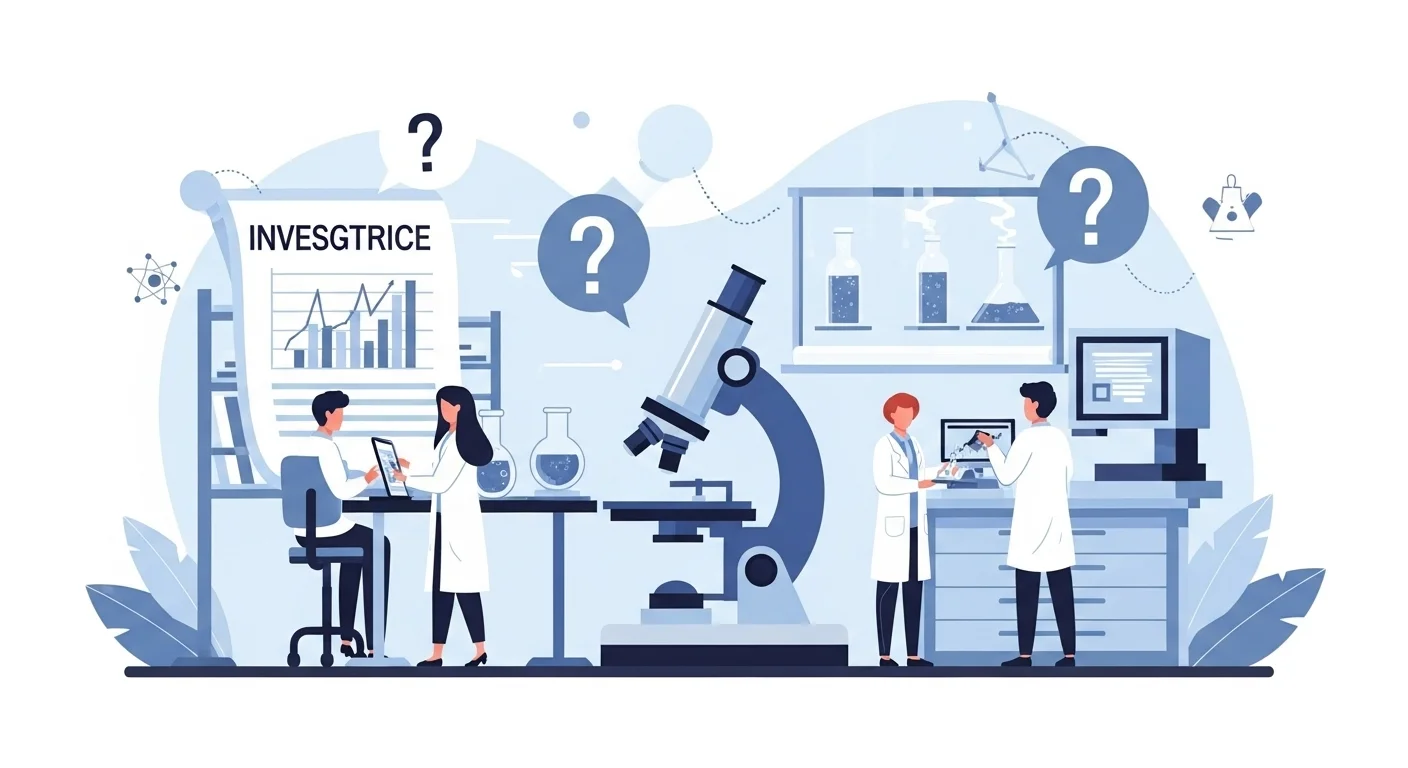
- Riddle: I am the process of testing a new drug or treatment on human subjects.
Hint: This stage determines safety and efficacy.
Answer: Clinical trial
- Riddle: I am the method of collecting and analyzing data to draw conclusions about a medical hypothesis.
Hint: This approach tests theories and develops new treatments.
Answer: Experimentation
- Riddle: I am the process of reviewing scientific literature to gather information on a medical topic.
Hint: This is essential for developing a research hypothesis.
Answer: Literature review
- Riddle: I am the method of testing a new treatment against a standard treatment or placebo.
Hint: This study design is used to determine effectiveness.
Answer: Randomized controlled trial
- Riddle: I am the process of obtaining informed consent from research participants.
Hint: This is crucial for ethical research practices.
Answer: Informed consent
- Riddle: I am the method of analyzing data to identify patterns and trends.
Hint: This statistical approach draws conclusions from research.
Answer: Data analysis
- Riddle: I am the process of publishing research findings in a scientific journal.
Hint: This shares knowledge with the medical community.
Answer: Publication
- Riddle: I am the method of funding medical research through grants and sponsorships.
Hint: This financial support is essential for studies.
Answer: Research funding
- Riddle: I am the process of peer review in medical research.
Hint: This ensures the quality and validity of research.
Answer: Peer review
- Riddle: I am the concept of replicating research findings.
Hint: This confirms the reliability of results.
Answer: Replication
- Riddle: I am the method of using animals in medical research.
Hint: This is often used before human trials.
Answer: Animal testing
- Riddle: I am the process of translating research findings into clinical practice.
Hint: This bridges the gap between research and patient care.
Answer: Translational research
Medical Technology Riddles
These riddles test knowledge of medical advancements.
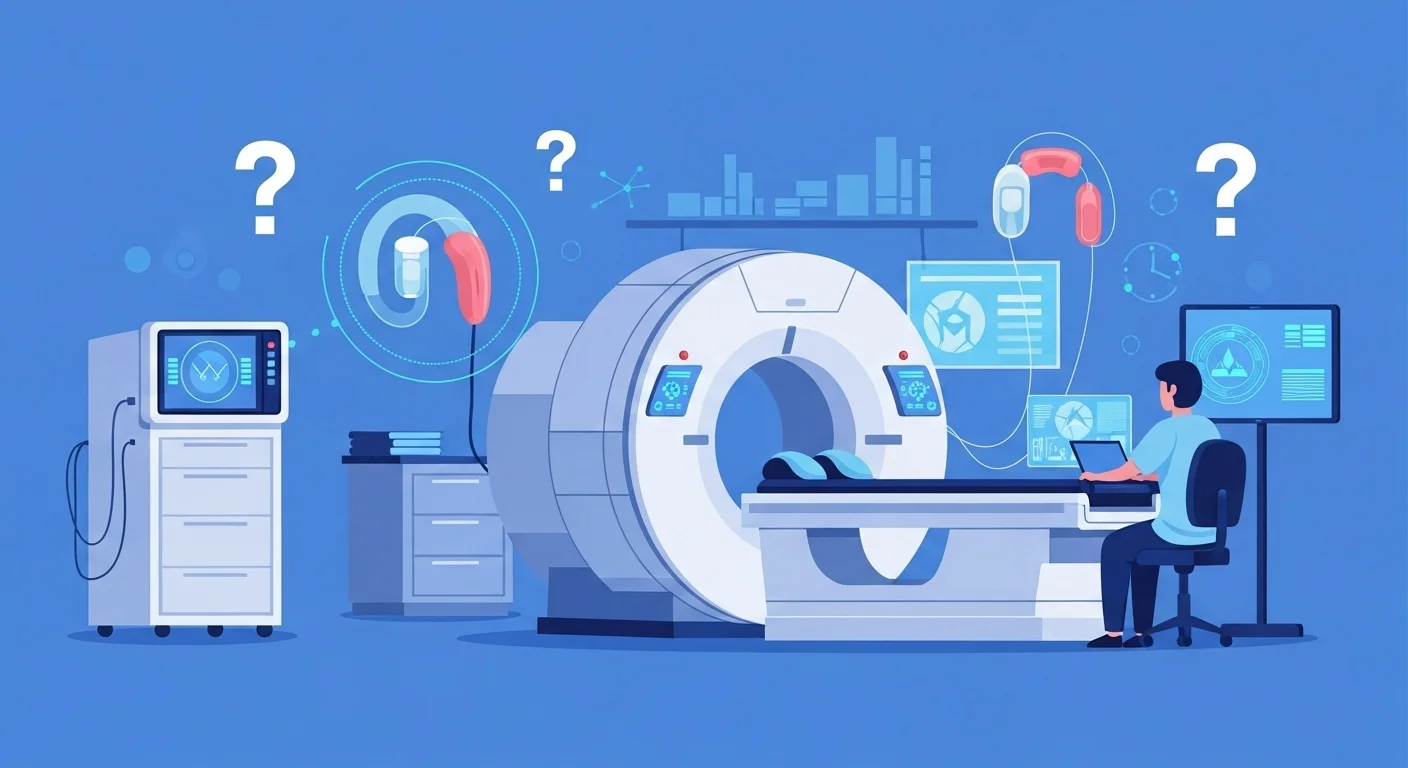
- Riddle: I am a device that uses sound waves to create images of internal body structures.
Hint: This technology is often used in obstetrics.
Answer: Ultrasound
- Riddle: I am a machine that provides mechanical ventilation to patients who cannot breathe on their own.
Hint: This device is commonly used in ICUs.
Answer: Ventilator
- Riddle: I am a device that uses magnetic fields to create detailed images of the body’s internal structures.
Hint: This technology is often used to diagnose tumors.
Answer: MRI (Magnetic Resonance Imaging)
- Riddle: I am a machine that delivers precise doses of radiation to treat cancer.
Hint: This device is used in radiation therapy.
Answer: Linear accelerator
- Riddle: I am a device that uses lasers to perform precise surgical procedures.
Hint: This technology is often used in eye surgery.
Answer: Laser surgery
- Riddle: I am a machine that provides continuous positive airway pressure to treat sleep apnea.
Hint: This device improves breathing during sleep.
Answer: CPAP machine
- Riddle: I am a device that uses electrical impulses to regulate the heart’s rhythm.
Hint: This technology is often implanted in patients with arrhythmias.
Answer: Pacemaker
- Riddle: I am a machine that provides hemodialysis to patients with kidney failure.
Hint: This device filters waste from the blood.
Answer: Dialysis machine
- Riddle: I am a device that measures blood glucose levels.
Hint: This tool is essential for diabetics.
Answer: Glucometer
- Riddle: I am a machine that uses X-rays to create cross-sectional images of the body.
Hint: This technology is often used for detailed imaging.
Answer: CT scanner
- Riddle: I am a device that monitors brain activity.
Hint: This tool is used in neurology.
Answer: Electroencephalogram (EEG)
- Riddle: I am a machine that assists in breathing by delivering oxygen directly to the lungs.
Hint: This device is used in cases of respiratory failure.
Answer: Mechanical ventilator
Medical Education Riddles
These riddles focus on training medical professionals.

- Riddle: I am the process of training medical students through hands-on experience in a clinical setting.
Hint: This stage involves working under supervision.
Answer: Residency
- Riddle: I am the examination that medical students must pass to become licensed physicians.
Hint: This test assesses knowledge and competency.
Answer: Board exam
- Riddle: I am the process of evaluating a medical student’s performance through practical examinations.
Hint: This assessment tests clinical skills.
Answer: Objective structured clinical examination (OSCE)
- Riddle: I am the training program that medical graduates complete to specialize in a particular field.
Hint: This involves advanced training in a specific area.
Answer: Fellowship
- Riddle: I am the process of teaching medical students through lectures and seminars.
Hint: This method provides theoretical knowledge.
Answer: Didactic learning
- Riddle: I am the training program that medical students complete to gain practical experience.
Hint: This stage involves working in a hospital or clinic.
Answer: Internship
- Riddle: I am the process of evaluating a medical student’s knowledge through written examinations.
Hint: This tests theoretical understanding.
Answer: Written exam
- Riddle: I am the concept of lifelong learning in medicine.
Hint: This is essential for staying current with medical advancements.
Answer: Continuing medical education (CME)
- Riddle: I am the process of mentoring medical students by experienced physicians.
Hint: This provides guidance and support.
Answer: Mentorship
- Riddle: I am the concept of interprofessional education in healthcare.
Hint: This involves learning alongside other healthcare professionals.
Answer: Interprofessional education
- Riddle: I am the process of assessing a medical student’s clinical reasoning skills.
Hint: This tests the ability to make diagnoses.
Answer: Clinical reasoning assessment
- Riddle: I am the concept of simulation-based learning in medical education.
Hint: This uses mannequins or virtual reality to practice skills.
Answer: Simulation training
Additional Medical Riddles
I have added a few more riddles to related to medical under different topics.
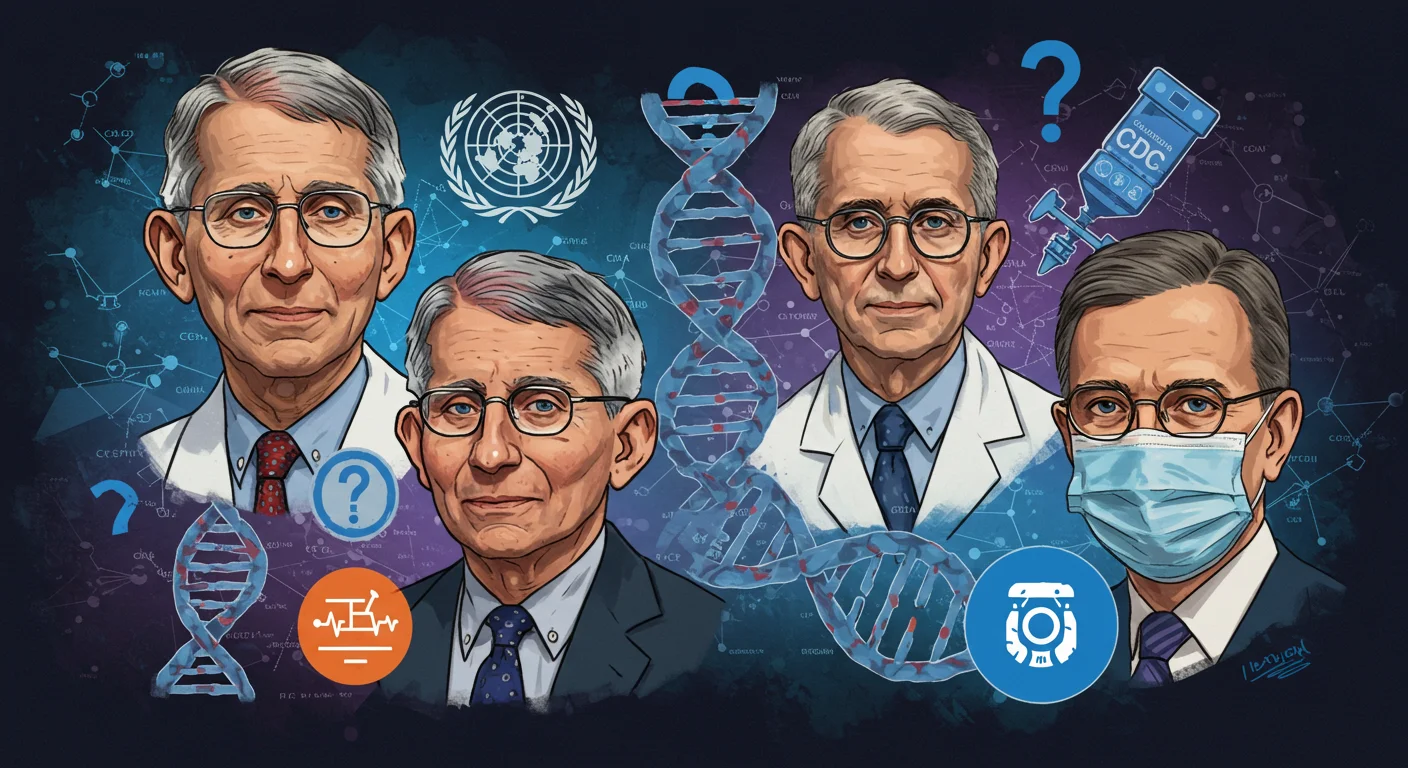
People Riddles
- Riddle: I saved countless lives by washing hands, proving cleanliness stops death. Who am I?
Hint: This doctor fought puerperal fever in the 19th century.
Answer: Ignaz Semmelweis
- Riddle: I helped unlock life’s code, though my role was long overlooked. Who am I?
Hint: My X-ray images shaped DNA’s discovery.
Answer: Rosalind Franklin
- Riddle: I guide nations through plagues, a voice of science in crisis. Who am I?
Hint: I’ve led U.S. health efforts for decades.
Answer: Anthony Fauci
- Riddle: I bring medicine to the poor, fighting disease across the globe. Who am I?
Hint: I co-founded Partners In Health.
Answer: Paul Farmer
Organizations Riddles
- Riddle: I’m a beacon of healing, famed for teamwork and care. What am I?
Hint: This clinic is in Minnesota.
Answer: Mayo Clinic
- Riddle: I train the best, research the unknown, a hospital of renown. What am I?
Hint: Located in Baltimore, it’s a leader in medicine.
Answer: Johns Hopkins Hospital
- Riddle: I unite doctors, setting standards for care. What am I?
Hint: This U.S. group advocates for physicians.
Answer: American Medical Association (AMA)
- Riddle: I watch the world’s health, battling outbreaks everywhere. What am I?
Hint: This UN agency is based in Geneva.
Answer: World Health Organization (WHO)
Products or Tools Riddles
- Riddle: I scan deep within, revealing secrets with positrons. What am I?
Hint: This imaging tool detects cancer and more.
Answer: PET scan
- Riddle: I guard against a silent threat, screening breasts for early signs. What am I?
Hint: This X-ray tool fights cancer in women.
Answer: Mammogram
- Riddle: I pump life’s sweetener, keeping sugar in check. What am I?
Hint: This device aids diabetics daily.
Answer: Insulin pump
- Riddle: I bring sound to silence, a marvel in the ear. What am I?
Hint: This implant restores hearing.
Answer: Cochlear implant
Scientific Concepts or Processes Riddles
- Riddle: I decode your blueprint, mapping life’s instructions. What am I?
Hint: This field studies your DNA.
Answer: Genomics
- Riddle: I tailor cures to you, a bespoke path to health. What am I?
Hint: This approach uses your unique traits.
Answer: Personalized Medicine
- Riddle: I edit life’s code, snipping genes with precision. What am I?
Hint: This tool revolutionized biology.
Answer: CRISPR gene editing
- Riddle: I unleash your body’s army, fighting tumors from within. What am I?
Hint: This cancer therapy boosts immunity.
Answer: Immunotherapy
Locations Riddles
- Riddle: I track disease from Atlanta, guarding public health. What am I?
Hint: This agency fights pandemics.
Answer: Centers for Disease Control and Prevention (CDC)
- Riddle: I fund discovery in Bethesda, advancing medicine’s frontier. What am I?
Hint: This U.S. institute drives research.
Answer: National Institutes of Health (NIH)
Comparing Medical Riddles to Regular Riddles
Medical riddles differ from regular riddles by combining specialized knowledge with creative problem-solving. While a regular riddle might ask, “What has keys but can’t open locks?” (a piano), medical riddles require understanding health concepts, like “I flow without cease within the living; a mirror to your health, yet never speaking. What am I?” (blood).
This specificity makes them ideal for medical education, reinforcing terminology memorably. For tips on solving riddles, check how to solve riddles like a pro.
Best Practices for Creating Medical Riddles
Do you want to make your own medical puzzles? Select the main word or concept from the medical field such as “stethoscope” or “diabetes.” After that, write a teasing clue that only hints at what the object does or what it is.
A good substitute for “I’m used by doctors” is: “I strive to discover hidden health troubles.” Make sure the wording is live and precise and make sure to check the riddle to determine if it’s both understandable and intriguing.
Medical Riddles in Education and Team Building
Medical riddles enhance learning in medical schools and strengthen healthcare teams. They encourage critical thinking, mimicking real clinical challenges, and foster collaboration among doctors, nurses, and staff. Learn more about their educational value at Mayo Clinic’s education resources.
An example would be a riddle on a medical procedure, as it can help students talk about its use and how it works. They are useful for easing collaboration between doctors, nurses and all team members.
Conclusion: The Power of Playful Learning
Medical puzzles help people understand medicine better, keep them interested and give them a good challenge to solve. Since they involve topics from anatomy and history, these riddles are excellent for enhancing one’s knowledge while having a good time. If you improve medical skills, work together with colleagues or just enjoy solving puzzles, these riddles blends excitement and challenges.
To me, learning through riddles is as interesting as doing a puzzle in a treasure hunt, where every right answer uncovers something new. We hope you enjoyed these fun stories and discovered something different. Please let us know if you have any medical riddles and we will be happy to read them below. You can pass this article on to anyone who likes to explore medical mysteries.
Frequently Asked Questions (FAQs)
What are medical riddles?
Medical riddles are brain teasers that use medical concepts, terminology, or scenarios as the basis for puzzles, combining education with entertainment to engage learners and professionals alike.
How can medical riddles help in education?
They make learning interactive, reinforce medical terminology, and enhance critical thinking, much like piecing together a diagnostic puzzle in a clinical setting.
Are medical riddles suitable for kids?
Yes, simpler riddles, like those about basic anatomy or medical tools, can spark curiosity in young learners while keeping things fun and age-appropriate.
How do medical riddles improve diagnostic skills
By encouraging you to think laterally about symptoms, procedures, or anatomy, riddles mimic the problem-solving process doctors use to diagnose patients.
Can medical riddles be used for team building?
Absolutely! They’re perfect for breaking the ice in healthcare settings, fostering collaboration, and sparking discussions among doctors, nurses, and students.
